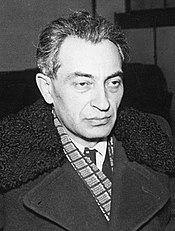|
Ernő Gerő
Ernő Gerő ([ˈɛrnøː ˈɡɛrøː]; born Ernő Singer; 8 July 1898 – 12 March 1980) was a Hungarian Communist leader in the period after World War II and briefly in 1956 the most powerful man in Hungary as the leader of its ruling communist party. Early careerGerő was born in Terbegec, Hont County of the Kingdom of Hungary (now Trebušovce, Slovakia) to Jewish parents, although he later repudiated religion. A member of the Hungarian Communist Party from its foundation (November 1918), he abandoned his studies when the Hungarian Soviet Republic was proclaimed and became a permanent member of the Young Communists. When the revolution was crushed, Singer emigrated to Vienna. He returned illegally to Hungary in September 1921 and was arrested after twelve months. Sentenced to 14 years in prison, he was released with a group of Communists after two years following a prisoner exchange agreement between Moscow and Budapest. Already speaking seven languages, he was hired by the Comintern apparatus in 1925, which immediately sent him to a factory for six months to learn Russian. During his two decades living in the USSR, Gerő was an active NKVD agent. Through that association, Gerő was involved in the Comintern—the international organization of communists—in France, and also fought in the Spanish Civil War, during which he performed purges against Trotskyist groups in the International Brigades.[1] The outbreak of the Second World War in Europe found him in Moscow again, and he remained for the duration of the war. After the dissolution of the Communist International in 1943, he was in charge of propaganda directed at enemy forces and prisoners of war. Gerő was among the first communist functionaries to return to Hungary in early November 1944.[1] He was a member of Hungary's High National Council (provisional government) between 26 January and 11 May 1945.[citation needed] In the November 1945 election, the Hungarian Communist Party, under Gerő and Mátyás Rákosi, got 17% of the vote, compared to 57% for the Smallholders' Party, but the Soviet commander in Hungary, Marshal Kliment Voroshilov, installed a coalition government with communists in key posts. The communists held an election and took full control in 1949, with Rákosi as party leader. Gerő and Mihály Farkas were Rákosi's right-hand men.[citation needed] Rákosi took over the premiership as well in 1952. However, his authority was shaken a year later by the death of Stalin, when Imre Nagy took over as prime minister. Gerő was retained as a counterweight to the reformers. Rákosi, having managed to regain control, was then undermined by Nikita Khrushchev's secret speech in early 1956 denouncing Stalinism and forced to leave office on 18 July 1956 by Anastas Mikoyan. He retained enough influence that the MDP designates Gerő to succeed him as party leader.[citation needed] Gerő interregnum Gerő led the country for a brief period, known as the 'Gerő Interregnum', from 18 July 1956 to 24 October 1956, just over three months. He had been Rákosi's close associate since 1948, and was involved in party expulsions, the industrialization and collectivization of Hungary.[citation needed] Later life and deathOn 23 October 1956, students marched through Budapest intending to present a petition to the government. The procession swelled as several people poured onto the streets. Gerő replied with a harsh speech that angered the people, and police opened fire. It proved to be the start of the Hungarian Revolution of 1956.[2] As the revolution spread throughout the country, the central committee met on 25 October and agreed that János Kádár should be made party leader and Imre Nagy be made prime minister, marking the end of the Gerő interregnum. Gerő went to the Soviet Union, but after the revolution was crushed, the Communist government of Kádár initially refused to let him return to Hungary.[citation needed] He was finally allowed to return from exile in 1960, but was promptly expelled from the Communist Party. He worked as an occasional translator in Budapest during his retirement. His character plays a central role in Vilmos Kondor's 2012 novel, Budapest Noir, and the whole series. He died in Budapest in 1980 at the age of 81.[3] References
BibliographyWikimedia Commons has media related to Ernő Gerő.
|
||||||||||||||||||||||||||||||||||||||||||||||||||||||||
